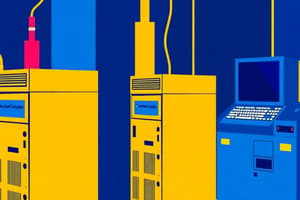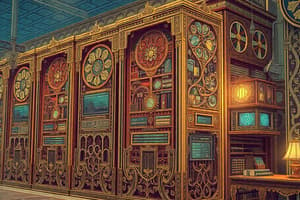Podcast
Questions and Answers
Which type of computer is known for being the most powerful, expensive, and specialized for research purposes?
Which type of computer is known for being the most powerful, expensive, and specialized for research purposes?
- Mainframe computer
- Microcomputer
- Minicomputer
- Supercomputer (correct)
What distinguishes mainframe computers from supercomputers?
What distinguishes mainframe computers from supercomputers?
- They are larger and more powerful
- They are slower but have more data storage capacity (correct)
- They are less powerful and cheaper
- They are used primarily for personal applications
Which type of computer is NOT designed for a single user and is commonly used in individual departments of large organizations?
Which type of computer is NOT designed for a single user and is commonly used in individual departments of large organizations?
- Microcomputer
- Supercomputer
- Minicomputer (correct)
- Mainframe computer
What distinguishes microcomputers from the other types mentioned?
What distinguishes microcomputers from the other types mentioned?
Which company is credited with inventing the Personal Computer (PC) in 1981?
Which company is credited with inventing the Personal Computer (PC) in 1981?
What is the main purpose of the Control Unit (CU) in a CPU?
What is the main purpose of the Control Unit (CU) in a CPU?
Which computer component is responsible for holding temporary results in high-speed memory slots?
Which computer component is responsible for holding temporary results in high-speed memory slots?
What type of memory is known for being volatile and losing data when the computer is switched off?
What type of memory is known for being volatile and losing data when the computer is switched off?
Which computer component is responsible for performing calculations and comparisons?
Which computer component is responsible for performing calculations and comparisons?
What is the purpose of Read-Only Memory (ROM) in a computer system?
What is the purpose of Read-Only Memory (ROM) in a computer system?
Flashcards are hidden until you start studying
Study Notes
Types of Computers
- Supercomputers are the most powerful computers, very expensive, and large in size, with fastest processing speed and large data storage capacity.
- Mainframe computers are less powerful than supercomputers, large, powerful, and expensive, processing and storing large amounts of data.
- Minicomputers are less powerful than mainframe computers, not designed for a single user, with less data storage capacity.
- Microcomputers are the fastest growing computers, cheapest, and specially designed for general usage, with types including personal computers, laptops, personal digital assistants (PDA), tablets, and smartphones.
Personal Computers
- IBM invented the personal computer in 1981, which initially ran an operating system called DOS (Disk Operating System).
- Today, most PCs run a version of Microsoft Windows.
- Personal computers are used by home users and office users.
Other Types of Computers
- Apple Mac, introduced in 1984, was the first to introduce a Graphical User Interface (GUI).
- Portable media players (PMP) are handheld multimedia devices that can play digital music, image, and movie files.
- Smartphones are mobile phones with advanced functionality, including displaying photos, playing videos, managing emails, and surfing the web.
- Laptops are small portable computers that can run on battery power, with notebooks being very thin laptops.
- Palmtops are even smaller computers that can fit into the palm of your hand.
- Tablet PCs offer all the functionality of a notebook PC, accepting input from a stylus or digital pen.
Basic Hardware Elements
- The central processing unit (CPU) is considered the brain of the computer, performing most calculations and responsible for the smooth running of the operating system and application programs.
- CPU architecture consists of the arithmetic and logic unit (ALU), control unit (CU), registers, and cache memory.
- CPU speed is determined by its internal clock speed, measured in Hertz (Hz) or Giga Hertz (GHz).
Memory
- The computer needs a working memory, called the main memory or primary storage, to store current programs and data.
- Random access memory (RAM) is the main working memory, storing data and programs temporarily, and is volatile (loses data when power is off).
- Read-only memory (ROM) is a non-volatile memory chip that holds software that can be read but not written onto, with examples including BIOS chips.
- Video graphics memory is a special memory chip that holds on-screen pictures.
Studying That Suits You
Use AI to generate personalized quizzes and flashcards to suit your learning preferences.




